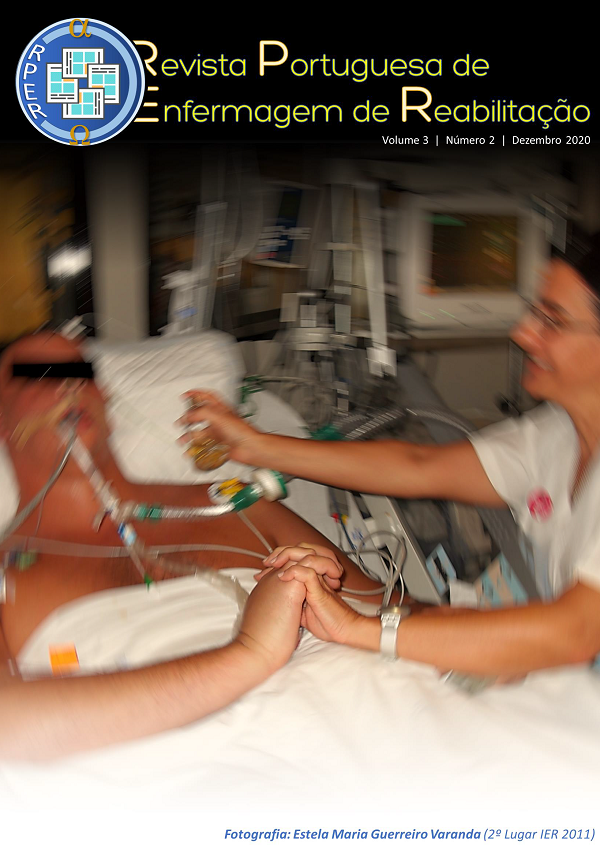Abstract
Introduction: The COVID-19 pandemic has had a significant global impact on health and socioeconomic status. At the same time, it has caused an overload on health systems and their professionals, including rehabilitation nurses. The real expression of this impact at the level of rehabilitation nurses is unknown.
Objective: To assess the impact of the COVID19 pandemic on Portuguese rehabilitation nurses.
Method: Observational, descriptive and cross-sectional study, with a non-probabilistic sample of Portuguese rehabilitation nurses who performed functions in any type of service in the three months prior to data collection. Data collection took place at the beginning of the third quarter of 2020 through an online questionnaire provided by email.
Results: Sample consisting of 146 nurses specialized in Rehabilitation Nursing (EEER), of which 31% (n = 45) had to cease providing specialized care during the pandemic (increase of 2.7x). Regarding satisfaction with the quality of care provided, the average before the start of the pandemic was 3.95 (SD ± 0.75) and during the pandemic it dropped to 2.9 (SD ± 1.11) (scale of 5-point Likert). Of the participants. 73.3% (n = 107) refer that they had, at some point, to follow institutional guidelines in disagreement with their ethical and deontological principles, with 69.9% (n = 102) reporting having had a need, at least a situation, to prioritize which sick people to care for. During the pandemic, the EEER relied on expert colleagues and online resources to increase knowledge and skills regarding the care inherent in the pandemic.
Conclusion: During the first pandemic peak by COVID 19, a significant part of the EEERs had to ensure only general care. The main challenges faced by EEER were in the field of organization and management of care due to the greater complexity of patients, the greater bureaucratic burden, changes in the relationship with co-workers and the need to balance professional and personal life. There was a decrease in satisfaction with the quality of care provided, as well as a high percentage of EEER who experienced ethical and deontological challenges. In order to ensure their continuous training and to update their skills and guarantee the quality and safety of nursing care, the EEERs have shown dynamism and a willingness to use information and communication technologies.
References
Di Gennaro F PDMCAMRVVNea. Coronavirus Diseases (COVID-19) Current Status and Future Perspectives: A Narrative Review. International journal of environmental research and public health. 2020 Apr.
WHO. WHO. [Online].; 2020. Available from: https://www.who.int/emergencies/diseases/novel-coronavirus-2019?gclid=Cj0KCQiA2uH-BRCCARIsAEeef3nQCzCLFK-tHyrqCcxU08PxtUM0NIQTJ-_M84OcJju5O60YkkYKK64aAhUuEALw_wcB.
WHO. World health statistics 2020: monitoring health for the SDGs, sustainable development goals: World Health Organization; 2020.
World Bank Group. Pandemic, Recession: The Global Economy in Crisis. In Global Economic Prospects. Washington: International Bank for Reconstruction and Development / The World Bank; 2020.
Khurshid A AAMAAAR. Living with Coronavirus (COVID-19): a brief report. European review for medical and pharmacological sciences. 2020 Oct: p. 10902–12.
Cacciapaglia G,CC&SF. Second wave COVID-19 pandemics in Europe: a temporal playbook. Sci Rep. 2020 Sep.
WHO..; 2020 [cited 2020 Nov 15. Available from: https://www.who.int/health-topics/coronavirus#tab=tab_3.
Zhang Y LYGHWL. Quantitative lung lesion features and temporal changes on chest CT in patients with common and severe SARS-CoV-2 pneumonia. PloS one. 2020 Jul.
Allegra A IVAAMC. Coagulopathy and thromboembolic events in patients with SARS-CoV-2 infection: pathogenesis and management strategies. Annals of Hematology. 2020 Sep.
WHO. COVID-19 Weekly Epidemiological Update - Nov 1st 2020. World Health Organization; 2020.
CDC. People with Certain Medical Conditions. [Online].; 2020 [cited 2020 Nov 15. Available from: https://www.cdc.gov/coronavirus/2019-ncov/need-extra-precautions/people-with-medical-conditions.html.
NIH. Coronavirus Disease 2019 (COVID-19): Treatment Guidelines. [Online].; 2020 [cited 2020 Nov 15. Available from: https://www.covid19treatmentguidelines.nih.gov/.
Haj Bloukh S EZSAPHA. Look Behind the Scenes at COVID-19: National Strategies of Infection Control and Their Impact on Mortality. International journal of environmental research and public health. 2020 Aug.
Bartolomé Benito E SVMMHIMSJ. Proposals by the Spanish Society of Quality in Healthcare (SECA) for the recovery of the National Health Service after the COVID-19 pandemic. Journal of healthcare quality research. 2020 Oct.
Elran-Barak R MM. One Month into the Reinforcement of Social Distancing due to the COVID-19 Outbreak: Subjective Health, Health Behaviors, and Loneliness among People with Chronic Medical Conditions. International journal of environmental research and public health. 2020 Jul.
Morgantini LA NUWHFSAÖFJea. Factors contributing to healthcare professional burnout during the COVID-19 pandemic: A rapid turnaround global survey. PloS one. 2020 Sep.
Mantelakis A SHLCCAJA. Availability of Personal Protective Equipment in NHS Hospitals During COVID-19: A National Survey. Annals of work exposures and health. 2020 Sep.
Bozda? F EN. Psychological Resilience of Healthcare Professionals During COVID-19 Pandemic. Psychological reports. 2020 Oct.
WHO. Maintaining essential health services: operational guidance for the COVID-19 context: World Health Organization; 2020.
Genovese TJ CAPJ. Physical Medicine and Rehabilitation in Rhode Island during the COVID-19 Pandemic. Rhode Island medical journal. 2020 Nov.

This work is licensed under a Creative Commons Attribution-NonCommercial-NoDerivatives 4.0 International License.
Copyright (c) 2020 Revista Portuguesa de Enfermagem de Reabilitação
Downloads
| Abstract Views | 1326 |
|---|
| PDF (Português (Portugal)) | 722 |
|---|
| HTML (Português (Portugal)) | 195 |
|---|
| 35 |
|---|





